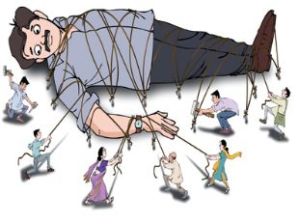People start businesses for any number of reasons, almost all of which are wrong. There is only one right reason, and you already know it.

So you want to be an entrepreneur?
Don’t do it. That’s my best advice.
At least it’s my best advice without knowing you. And since I don’t know you, I assume that you want to become an entrepreneur for the same reasons as most people. The same wrong reasons.
Wrong reason number 1: To make money
Depending on how you count, 95% to 99% of new businesses fail. Even the ones that succeed rarely bring huge financial rewards to their founders. If you’re a generally smart, talented and energetic person (and you probably are, if you’re reading this) and want to maximize your lifetime earnings, starting a company is a very inefficient way of doing it. If you want to maximize your lifetime earnings, get a steady, well-paying job and stick with it.
Here’s the most likely thing that’s going to happen if you start your own company: you’ll work very hard for three to seven years, scrape together just enough money to survive during that time, then close down when you get tired or something in the world changes to make your business model unsustainable. You’ll lose several years of good income and, if you return to work at a big company, be several years behind on your career path. And that’s far from the worst-case scenario.
Sure, there are many notable exceptions–people who started businesses and made loads of money. There’s Bill Gates, Steve Jobs, and Hiroshi Mikatani and, um, Ronald McDonald (not his real name). There are lots of rich entrepreneurs. There are also lots of people who win the lottery. But there are many, many more who don’t. And being an entrepreneur is much harder work than buying a lottery ticket.
In other words, if you think that becoming an entrepreneur is a good way to make money, you’re just bad at math. Side note: you need to be pretty good at math to be a successful entrepreneur, so that’s already two strikes against you.
Wrong reason number 2: To have power
You may think that starting a company and being the CEO is a good way to gain respect and authority. After all, just look at the traditional corporate organizational chart: an orderly pyramid of subordinates extends down from the CEO, perched all the way on top.
Right. But if you’re starting your own company, it doesn’t work that way.
When you’re the CEO of a start-up, it feels like everybody is your boss. All of your employees are your boss. Your customers, your investors, even the media: they’re all your boss. I’ve never worked for so many people as I do at Evernote. Don’t expect fame and prestige either; with very few exceptions the life of an entrepreneur is humble.
Wrong reason number 3: To have more free time
I’ve actually had people tell me that they want to start their own company to get control of their schedule and have more free time. Let’s not spend too many words on this. When you’re the CEO of your own company you do get to have a very flexible schedule: you can work any twenty hours in the day you want. If you’re looking to spend more time with your family, the entrepreneurial path is not recommended.
So there are many wrong reasons to want to be an entrepreneur. I think there’s only one good reason:
Right reason number 1 (and only): to change the world
Of course, you don’t have to be an entrepreneur to change the world. You could be a great artist, or a musician, scientist, or politician. I couldn’t be any of those things because I don’t have the talent. But I still wanted to have an impact–to make the universe notice, if even in a small way, that I’d lived in it. The only way left was to be an entrepreneur. And to try to be a good one.
To find out whether or not you should try as well, perform this simple mental experiment. Imagine you knew, with 100% certainty, that the following would happen if you started your company: You will work on your idea every day for ten years. It will be the hardest work you’ve ever done. And your idea will succeed! Millions of people will use your product and the world will be a slightly better place because of it. However, through a series of complications, you will make absolutely no money in the process. Ten years of back-breaking work, and not a single dollar to show for it. Would you still start the company?
If your answer is, “of course not,” congratulations! You’re a sane and reasonable person and you should stay at your job and avoid the entrepreneurial path.
If your answer is “yes”…
If your answer is “yes,” you’ve got a very difficult road ahead of you. The bad news is, you will almost certainly fail. The good news is, if you aren’t afraid of failure, and you want to start a company for the right reason, there has never been a better time to do it. There are amazing opportunities for entrepreneurs today that never existed before.
So to get back to your question: How much confidence did my co-founders and I have when starting our first business? Not very much. How certain were we that we should do it anyway? 100%. We were ready to fail.
Are you?
